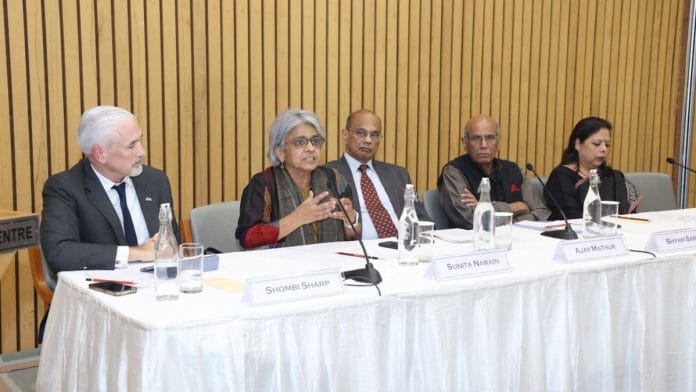New Delhi: Disappointed by the fizzled-out climate talks on the Caspian Sea’s shores in Baku last month, a diverse group of environmentalists, climate experts, government officials, and UN representatives huddled in New Delhi’s India International Center to carry out a post-mortem and find out “what went wrong”. They also proposed a future course to salvage the planet.
“The saddest part of the entire debate and discussion is that climate change is treated as a business opportunity rather than an urgent crisis,” said Leena Nandan, Secretary of the Environment, Forest and Climate Change Ministry, implicating the richer nations during climate negotiations at Baku.
The discussion, titled ‘COP29: Progress or Posturing? The wins, woes, and what was missed’ saw about 100 people turn up on a cold Delhi evening.
“India and the world should have rejected the $300 billion agreement [climate finance deal]—it’s crumbs, not even peanuts. A no-deal would have been better than the deal we have returned with,” said environmentalist Sunita Narain, one of the panellists.
Narain pointed out that this so-called agreement consigns 70 per cent of the world to continue developing unsustainably, adding to emissions and worsening the climate crisis. Instead of creating an enabling framework, it has set up a disabling one, leaving the majority of the world with no real options for sustainable growth.
Yet, Narain championed the United Nations’ multilateral approach as the best way to channel this dissent.
“Multilateralism is non-negotiable. The UN remains the only platform where nations unite, and addressing climate change requires a collective effort,” she said.
Narain used the example of Delhi’s air pollution to highlight how climate change acts as a great equaliser, underscoring the need for collaboration.
“Delhi’s air pollution affects everyone, regardless of social status. While the poor bear the brunt, no one is immune to its severe health impacts—even air purifiers offer limited protection,” she added.
Shifting models
The UN deal, in its current form, is little more than a weak promise of $300 billion, with an implicit expectation that developing economies will contribute their share.
“The burden for climate costs is changing unjustly, moving from the ‘polluter pays’ model to the ‘I pollute, you pay’ model,” said Founder and CEO of the Council on Energy, Environment and Water (CEEW) Arunabha Ghosh.
He stressed that climate funding should be concessional, consistent, catalytic, and convenient—but currently, it is none of these.
Ghosh highlighted that, in addition to the limited financial commitments from the developed world to support green transitions and help vulnerable countries build resilience against extreme weather, the G7 countries—historically the biggest polluters—have delayed the coal phase-out until 2035. This decision consumes four billion tons of carbon space that could have been used by the rest of the world.
Also read: How queer are universities? Architect imagines DU north campus as a non-binary lesbian
World needs an ultimate socialist project
Equity in climate agreements has been steadily chipped away.
Over three decades ago, the principles of Common but Differentiated Responsibilities (CBDR) were introduced in the UN through the 1992 Rio Convention.
“CBDR made sense—countries were asked to cut carbon emissions based on historical emissions. But then came the Paris Agreement in 2016, which reversed this progress. The concept of NDCs [Nationally Determined Concepts] was brought in to disable the concept of equity,” said Narain.
She added that the Paris Agreement messed up the global carbon budget, which is the amount of CO2 the world can emit in order to limit global warming to a set target like 1.5 degrees Celcius. 70 per cent of the world’s population, currently facing energy poverty, have access to just 30 per cent of the carbon budget.
“India, which has a right to development, will end up polluting the atmosphere, adding to the stock of greenhouse gases in the atmosphere, adding to more and more catastrophes that we are seeing today,” said Narain.
She pointed out that recent data shows migration is now driven not just by war and conflict but also by new causes like drought, floods, agrarian distress, and displacement. This forces people out of their homes, creating insecurity worldwide. Ironically, the rich are increasingly worried about migration, fueling a more unstable and insecure global scenario.
“This calls for an ultimate global balancing act—where the rich must reduce emissions so the poor can grow,” said Narain.
Also read: Yuval Noah Harari, Aamir Khan discuss dangers of AI. Microsoft’s Copilot defends itself
Say no to ‘cheap development mechanisms’
The Western world, crying broke on public finance, is betting big on carbon credits. Their plan is to let the markets save the planet.
“Clean Development Mechanism [CDM], often dubbed the ‘corrupt’ or ‘cheap’ development mechanism, is now being revived in the guise of carbon markets,” said Narain.
She pointed out that the approach presents both risks and opportunities. While carbon markets could fund transformative projects, they also risk repeating past mistakes. Under CDM, cheap measures dominated, benefiting developers, auditors, and registries while neglecting meaningful change.
Climate change demands collective action and meaningful investment, not schemes that prioritise profit over genuine transformation. Narain emphasised that India’s existential climate threat demands real, lasting solutions—not quick fixes for short-term financial gains.
She went back to Delhi’s air pollution problem to put her point across.
Every day, Delhi registers 1,700 new vehicles. The figure doesn’t even include the surrounding regions like Gurgaon, Faridabad, and Noida. Worse yet, the focus on e-buses has not increased ridership; it’s going down. This crisis in mobility and air pollution presents an opportunity to act.
Narain highlighted that transport emissions contribute 20 per cent to global climate change. This crisis can be turned into a chance for solutions.
“Our priority should be securing co-benefits—improving mobility and air quality—while demanding high-end technology, even if it means using the market. We are not going to sell ourselves cheap anymore,” she said, imploring India and the world to reject the cheap climate deal from COP29.
(Edited by Prasanna Bachchhav)






